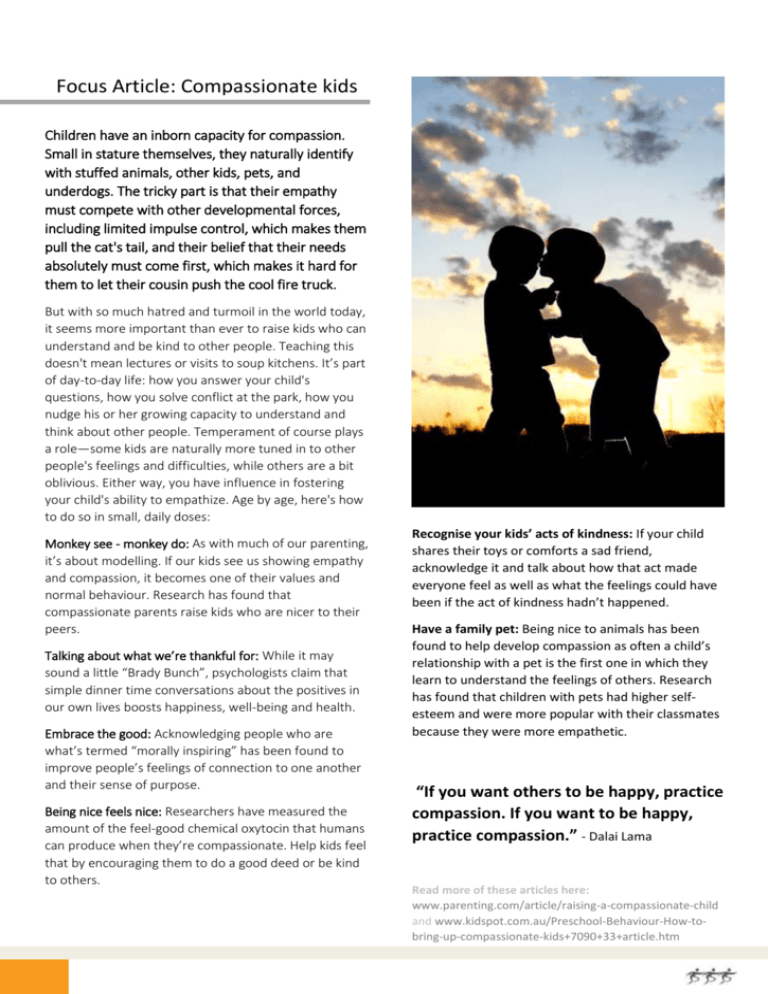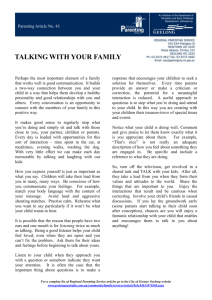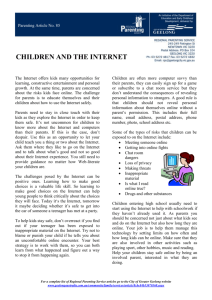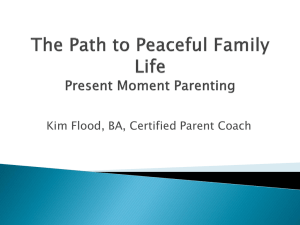Newsletter Term 2 Week 2 Part 2
advertisement

Focus Article: Compassionate kids Children have an inborn capacity for compassion. Small in stature themselves, they naturally identify with stuffed animals, other kids, pets, and underdogs. The tricky part is that their empathy must compete with other developmental forces, including limited impulse control, which makes them pull the cat's tail, and their belief that their needs absolutely must come first, which makes it hard for them to let their cousin push the cool fire truck. But with so much hatred and turmoil in the world today, it seems more important than ever to raise kids who can understand and be kind to other people. Teaching this doesn't mean lectures or visits to soup kitchens. It’s part of day-to-day life: how you answer your child's questions, how you solve conflict at the park, how you nudge his or her growing capacity to understand and think about other people. Temperament of course plays a role—some kids are naturally more tuned in to other people's feelings and difficulties, while others are a bit oblivious. Either way, you have influence in fostering your child's ability to empathize. Age by age, here's how to do so in small, daily doses: Monkey see - monkey do: As with much of our parenting, it’s about modelling. If our kids see us showing empathy and compassion, it becomes one of their values and normal behaviour. Research has found that compassionate parents raise kids who are nicer to their peers. Talking about what we’re thankful for: While it may sound a little “Brady Bunch”, psychologists claim that simple dinner time conversations about the positives in our own lives boosts happiness, well-being and health. Embrace the good: Acknowledging people who are what’s termed “morally inspiring” has been found to improve people’s feelings of connection to one another and their sense of purpose. Being nice feels nice: Researchers have measured the amount of the feel-good chemical oxytocin that humans can produce when they’re compassionate. Help kids feel that by encouraging them to do a good deed or be kind to others. Recognise your kids’ acts of kindness: If your child shares their toys or comforts a sad friend, acknowledge it and talk about how that act made everyone feel as well as what the feelings could have been if the act of kindness hadn’t happened. Have a family pet: Being nice to animals has been found to help develop compassion as often a child’s relationship with a pet is the first one in which they learn to understand the feelings of others. Research has found that children with pets had higher selfesteem and were more popular with their classmates because they were more empathetic. “If you want others to be happy, practice compassion. If you want to be happy, practice compassion.” - Dalai Lama Read more of these articles here: www.parenting.com/article/raising-a-compassionate-child and www.kidspot.com.au/Preschool-Behaviour-How-tobring-up-compassionate-kids+7090+33+article.htm Assessment of Early Childhood Education Services The National Quality Standard (NQS) promotes continuous quality improvement. Children's education and care services covered under the Education and Care Services National Law are assessed and rated against the NQS. The process reflects a uniform approach to assessment and reporting across the range of service settings. The relevant regulatory authority in each state and territory undertakes the assessment and rating process. It is also the point of contact for any questions services may have about the assessment and rating process. See more at: http://acecqa.gov.au/nationalquality-framework/assessments-andratings#sthash.Ia3XVPjN.dpuf IT IS NOT KNOWLEDGE, BUT THE ACT OF LEARNING, NOT POSSESSION BUT THE ACT OF GETTING THERE WHICH GRANTS THE GREATEST ENJOYMENT. – C F GAUSS. In the coming weeks, Alma Bugdlie Preschool is going to be assessed against the National Standards by an independent assessor. As a result there will be one or two new faces about. There is a possibility that you and your child, as the families of our service, may be asked questions about different aspects of Bugdlie Preschool. Please don’t hesitate to provide your opinions if approached by an assessor. We welcome your open and honest feedback. IMPORTANT REMINDER TO UPDATE CHILDREN’S INFORMATION It is our duty of care to ensure that we are prepared to act quickly and responsibly in the event of all emergency situation types. To do this effectively we need your help. If any of the following information has changed since enrolment / re-enrolment (January) please contact us as soon as possible: Your address & contact details Authorised emergency contacts Happy Birthday Emergency contact phone numbers Kyreece Any changes to your child/children’s health information Authorised persons given permission to collect your child / children Persons authorised to consent (or administer) to medical treatment Authorised Educator/s to take the child outside the education and care service premises Details of any court / parenting orders How can we make your child’s experience at Bugdlie even better? What information would you like to have about what we do at Bugdlie? Email: Bugdlie Phone: 80881244 Fax: 80873691 Phone number:Mobile: 0474150779







